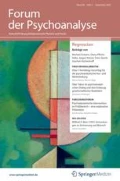Zusammenfassung
Die Bedeutung der Adoleszenz für die psychosoziale Entwicklung wird kontrovers diskutiert zwischen der betonten Gewichtung der frühen Kindheit und schon von Freud vertretenen Vorstellungen, die in der Dynamik der Adoleszenz einen wichtigen Beitrag zur seelischen Entwicklung des Individuums und des Kulturwandels sehen. Der Verlauf der Adoleszenz bietet einen oft zu wenig berücksichtigten Ausgangspunkt für das Verständnis der Psychodynamik von Patienten. Heute kommen immer wieder Mitte Dreißigjährige in die Behandlung, die ihre Adoleszenz zur Zeit des politischen Umbruchs in Deutschland erlebten. Aus verschiedenen Gründen stellte sich das vor allem für Ostdeutsche als eine vulnerable Lebensphase dar. Pubertät und Adoleszenz beinhalten Entwicklungsaufgaben, deren Bewältigung unter einer krisenhaften Situation, wie sie die politische Wende in Ostdeutschland mit der Wiedervereinigung darstellte, besonders zu leiden hatte. Die Folgen dieses konflikthaften Bewältigungsprozesses lassen sich dementsprechend später in den Therapien im Übertragungsgeschehen und in den zentralen Beziehungskonflikten auffinden. Es fanden starke Anpassungsbemühungen der Adoleszenten an die neuen Verhältnisse statt, ohne dass die adoleszente Auseinandersetzung mit den DDR-Eltern und -Verhältnissen ausreichend stattgefunden hatte. Es wird die Behandlung einer Patientin vorgestellt, bei der die Wende während ihrer Adoleszenz zu einem kritischen Lebensereignis wurde. Ihre narzisstischen Defizite mit der fragilen Identität vertieften sich durch die gesellschaftlichen Umbrüche. Es wird gezeigt, wie dieses „kritische Lebensereignis“ mit ihren frühen psychischen Strukturen, den Problemen der Adoleszenz und ihrer Identitätsfindung im Laufe ihrer Psychoanalyse verwoben war.
Abstract
The significance of adolescence for psychosocial development is a controversial theme with discussions ranging from an emphasis on the importance of early childhood to the ideas propagated by Freud that the dynamics of adolescence play an important role in the psychological development of the individual and transculturation. The course of adolescence provides a starting point for understanding the psychodynamics of patients, which is often given insufficient consideration. Today, it can repeatedly be seen that patients in their mid-thirties are coming for treatment: patients who experienced their adolescence during the period of political upheaval in Germany. For a variety of reasons this proves to have been a vulnerable life phase, above all for East Germans. Puberty and adolescence comprise developmental tasks whose completion in a crisis situation, such as represented by the political change in East Germany with the reunification process, suffered considerably. Accordingly, the consequences of this conflict-laden coping process can be revealed during later therapy in transference and central relationship conflicts. The adolescents made considerable efforts to adapt to the new conditions, however, without adolescent altercations with GDR parents and conditions having taken place in sufficient measure. The treatment of a female patient is presented for whom the political change during adolescence proved to be a critical life event. Her narcissistic deficits together with her fragile identity were exacerbated as a result of the social upheavals. It is demonstrated how this “critical life event” was intertwined with her earlier psychological structure, the problems of adolescence and her search for identity during the course of psychoanalysis.
Literatur
Bischof N (1998) Das Kraftfeld der Mythen. Piper, München
Blos P (1962) Adoleszenz. Klett-Cotta, Stuttgart (2001)
Erdheim M (1982) Die gesellschaftliche Produktion von Unbewußtheit. Suhrkamp, Frankfurt a. M.
Erikson EH (1968) Jugend und Krise. Die Psychodynamik im sozialen Wandel. Klett-Cotta, Stuttgart (2003)
Freud S (1905b) Drei Abhandlungen zur Sexualtheorie. Gesammelte Werke, Bd 5, Fischer, Frankfurt a. M., S 27–159
Funk R (2005) Ich und Wir. Psychoanalyse des postmodernen Menschen. dtv, München
Author information
Authors and Affiliations
Corresponding author
Rights and permissions
About this article
Cite this article
Horzetzky, FA. Die Auswirkungen der Wende 1989 auf Adoleszente. Forum Psychoanal 28, 89–100 (2012). https://doi.org/10.1007/s00451-011-0074-8
Published:
Issue Date:
DOI: https://doi.org/10.1007/s00451-011-0074-8

